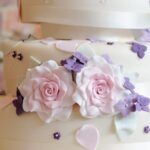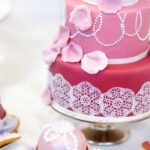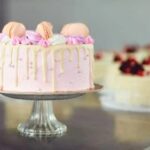Cake decorating is an art form that has become an essential part of the baking industry. A cake decorator is responsible for turning a plain cake into a visually stunning masterpiece through the use of various techniques, styles, and creativity.
This article will delve into the role of a cake decorator, the skills and qualifications required, the tools and equipment used, as well as the training and education necessary to succeed in this field. Additionally, we will explore career opportunities, challenges, and rewards associated with cake decorating.
The importance of cake decoration cannot be overstated as it adds a personalized touch to any celebration or event. From weddings to birthdays, cakes are often the centerpiece of these special occasions, making them memorable with beautiful designs that showcase the skill and talent of a cake decorator.
Throughout history, cake decoration has evolved from simple icing designs to complex sculpting and airbrushing techniques. Understanding this evolution and its impact on modern cake decorating is crucial in appreciating the artistry involved in this profession. In the following sections, we will examine how cake decorators have adapted to changing trends and technologies while upholding traditional methods in their craft.
Skills and Qualifications
A cake decorator is an individual who specializes in the art of decorating cakes with various designs, patterns, and intricate details using icing, frosting, and other edible decorations. The role of a cake decorator is essential in the baking industry as they are responsible for transforming plain cakes into visually stunning creations that are not only delicious but also aesthetically pleasing.
Cake decoration has been an integral part of baking for centuries, with the practice dating back to ancient civilizations where elaborate cakes were prepared for special occasions and celebrations.
To excel as a cake decorator, several skills and qualifications are required. Firstly, creativity and artistic skills are fundamental as they allow the decorator to conceptualize and create unique designs that cater to the specific needs and preferences of their clients. Additionally, knowledge of various icing and frosting techniques is crucial in achieving different textures and finishes on the cakes.
This involves mastering skills such as piping, flooding, and smoothing to create intricate designs. Attention to detail and precision is also paramount in ensuring that every element of the decoration is executed flawlessly. Lastly, patience and time management skills are necessary as cake decorating can be a time-consuming process, especially when working on elaborate designs.
In order to execute their craft effectively, cake decorators rely on a range of tools and equipment specifically designed for cake decorating. Essential tools include offset spatulas for spreading icing, bench scrapers for smoothing surfaces, and various types of pastry brushes for applying edible colors or glazes.
Different types of icing bags and tips are used to achieve different piping techniques such as rosettes, shells, or basketweave patterns. Specialty tools like fondant embossers or silicone molds are also utilized for creating intricate designs such as flowers or geometric patterns on fondant-covered cakes.
Overall, becoming a skilled cake decorator requires a combination of natural talent, technical proficiency, and continuous learning in order to keep up with evolving trends in cake decorating styles and techniques. With the right skills and qualifications, individuals can embark on a rewarding career path as a professional cake decorator whether it’s working in established bakeries or pastry shops or even starting their own cake decorating business.
Tools and Equipment
Cake decorating requires a specific set of tools and equipment to create the intricate designs and decorations that make cakes visually appealing. Some essential tools for cake decorating include offset spatulas for smoothing icing, piping bags and various tips for creating different shapes and designs, as well as a turntable to easily rotate the cake while decorating. Additionally, specialty tools such as fondant smoothers, sculpting tools, and edible image printers are used for more intricate and detailed cake designs.
Different types of icing bags and tips are also crucial for achieving various effects in cake decoration. Piping bags come in disposable or reusable options, while piping tips come in different sizes and shapes to create specific patterns or textures. For example, a star-shaped tip can be used for creating rosettes or borders, while a round tip is perfect for writing or drawing intricate lines on the cake.
In addition to basic tools, professional cake decorators may also use specialty equipment such as airbrush machines for applying color gradients or intricate designs on cakes. These airbrush machines allow decorators to create beautiful ombre effects or delicate stenciled patterns on cakes with precision.
Overall, having the right tools and equipment is crucial for a cake decorator to bring their creative visions to life and meet the expectations of their clients.
| Tools | Equipment |
|---|---|
| Offset spatula | Turntable |
| Piping bags | Fondant smoothers |
| Piping tips | Sculpting tools |
| Airbrush machine | Edible image printer |
Techniques and Styles
Buttercream Piping
One of the most popular and versatile techniques in cake decorating is buttercream piping. This involves using a piping bag and various tips to create intricate designs and patterns on cakes and cupcakes.
From simple swirls to elaborate floral arrangements, buttercream piping allows cake decorators to showcase their creativity and artistic skills. The key to successful buttercream piping lies in having steady hands, as well as a good understanding of different piping tips and the pressure required to achieve various designs.
Fondant Sculpting
Fondant sculpting is another essential skill for cake decorators, especially for creating detailed 3D decorations and figurines. Fondant, a type of icing with a smooth, pliable consistency, can be shaped and molded into almost any form imaginable, making it ideal for creating lifelike flowers, animals, characters, and other intricate details.
Mastering fondant sculpting requires patience, precision, and a keen eye for detail. Cake decorators often use specialized tools such as fondant modeling sticks and shaping tools to bring their creations to life.
Airbrushing
An advanced technique that has become increasingly popular in recent years is airbrushing. With an airbrush tool, cake decorators can apply edible color dyes in a fine mist, allowing for seamless blending of colors and the creation of beautiful gradients on cakes. Airbrushing gives cake decorators the ability to achieve professional-looking finishes and add depth and dimension to their designs. While mastering airbrushing may require some practice and patience due to its technical nature, the results are truly captivating.
Edible Image Printing
In today’s digital age, cake decorators also have the option of incorporating edible image printing into their repertoire. This technique involves printing high-quality images or designs onto edible paper using food-grade ink.
These printed images can then be applied to cakes or cookies for a truly personalized touch. Whether it’s replicating a couple’s wedding photo or featuring a child’s favorite cartoon character on a birthday cake, edible image printing offers endless possibilities for creative expression in cake decorating.
By mastering these techniques and styles, cake decorators are able to bring their artistic visions to life while delivering memorable experiences through their beautifully decorated confections.
Training and Education
Becoming a proficient cake decorator requires a combination of natural creativity and acquired skills. Many cake decorators start by developing their artistic abilities through self-teaching or formal education. There are various training and education options available for those interested in pursuing a career in cake decoration.
Formal education and training programs in culinary arts or pastry arts often include courses specifically focused on cake decorating. These programs provide aspiring cake decorators with the opportunity to learn the fundamental techniques, styles, and tools used in the industry. Additionally, apprenticeship and on-the-job training can offer hands-on experience under the guidance of experienced professionals. This type of training allows individuals to gain practical skills while working in commercial bakeries, pastry shops, or specialty cake shops.
Continuous learning and professional development are essential for cake decorators to stay updated with the latest trends and techniques in the field. Many decorators attend workshops, seminars, or online courses to expand their knowledge and expertise. Mastering new techniques such as advanced fondant sculpting or intricate piping designs can open up doors to new career opportunities.
The path to becoming a successful cake decorator is not limited to traditional education routes but also includes ongoing self-improvement through practice and learning. Aspiring decorators are encouraged to explore different educational paths that suit their personal learning style and career goals.
| Education | Training |
|---|---|
| Formal education programs | On-the-job training |
| Culinary arts courses | Apprenticeships |
| Continuing education workshops | Self-teaching methods |
Career Opportunities
A career as a cake decorator offers various opportunities for individuals who are passionate about baking and creativity. Whether you dream of working in a bakery, starting your own cake decorating business, or becoming a freelance cake decorator, there are several paths to pursue in this field.
Working in Bakeries and Pastry Shops
Many cake decorators begin their careers by working in bakeries and pastry shops. In these settings, they have the chance to gain valuable experience, develop their skills, and learn from experienced professionals. They often collaborate with pastry chefs and bakers to create stunning cakes for special occasions such as weddings, birthdays, and anniversaries. Working in a bakery or pastry shop allows cake decorators to showcase their creativity while honing their craft in a fast-paced environment.
Freelance Cake Decorating
For those who prefer more flexibility and independence, freelance cake decorating can be an attractive option. As a freelance cake decorator, individuals have the freedom to choose their clients and projects, work from home or rent kitchen space as needed, and set their own schedules. This career path requires strong networking and marketing skills to attract clients and build a loyal customer base. Freelance cake decorators often handle custom orders for events ranging from corporate gatherings to intimate celebrations.
Starting a Cake Decorating Business
Entrepreneurial-minded cake decorators may decide to establish their own cake decorating business. This endeavor involves careful planning, creativity not only in design but also in marketing strategies and business operations. From securing the necessary permits and licenses to creating an impressive portfolio of designs, starting a cake decorating business demands determination and perseverance. However, it can be immensely satisfying for individuals who wish to turn their passion for cake decoration into a successful enterprise.
Challenges and Rewards
Cake decorating is not just about creating beautiful and delicious cakes; it also comes with its own set of challenges and rewards. One of the main challenges that cake decorators often face is handling last-minute requests and tight deadlines.
Whether it’s a client who forgot to place an order or a sudden change in plans, cake decorators must be able to work under pressure and deliver high-quality products in a short amount of time. This requires excellent time management skills and the ability to stay calm under stress.
Despite the challenges, being a cake decorator also comes with many rewards. One of the most satisfying aspects of this profession is the ability to create custom designs that bring joy to clients and their loved ones. Whether it’s a child’s birthday cake or a wedding masterpiece, seeing the delight on someone’s face when they see their cake for the first time can be incredibly fulfilling.
Another reward of being a cake decorator is overcoming creative blocks and burnout. It can be easy to feel uninspired or drained after working on multiple projects, but finding new sources of inspiration and pushing through those moments can lead to personal growth and renewed excitement for the craft. Overcoming these challenges can ultimately make the work even more rewarding.
Conclusion
In conclusion, a cake decorator plays a crucial role in creating visually stunning and delicious baked goods. The art of cake decorating is not only important for making cakes aesthetically pleasing but also for adding a personal touch to special occasions such as weddings, birthdays, and other celebrations. Throughout history, cake decorating has evolved from simple designs to intricate and elaborate masterpieces, showcasing the creativity and skills of talented individuals in this field.
Becoming a successful cake decorator requires a unique set of skills and qualifications, including creativity, knowledge of various icing techniques, attention to detail, and patience. Additionally, having the right tools and equipment is essential for executing different decorating techniques such as buttercream piping, fondant sculpting, airbrushing, and edible image printing. Whether pursuing formal education or engaging in on-the-job training, continuous learning is crucial for staying current with trends and techniques in cake decoration.
For those interested in pursuing a career in cake decorating or simply exploring it as a creative outlet, there are various opportunities available such as working in bakeries or pastry shops, freelancing, or even starting a cake decorating business. While challenges such as last-minute requests and tight deadlines may arise, the satisfaction of creating custom designs far outweighs the difficulties. Ultimately, cake decorating offers endless opportunities for artistic expression while bringing joy to others through delectable confections.
Frequently Asked Questions
What Do Cake Decorators Do?
Cake decorators are skilled professionals who specialize in decorating cakes with various types of icing, fondant, and edible decorations. Their job involves creating visually appealing designs, patterns, and themes on cakes for special occasions such as weddings, birthdays, and other celebrations.
How to Be a Cake Decorator?
To become a cake decorator, one should start by gaining basic baking and pastry skills through formal education or hands-on training. It’s important to develop a good understanding of different types of icing, piping techniques, and decorative elements. Practice and creativity are essential in honing the craft as well as keeping up with current trends in cake decorating.
What Is a Cake Decorator?
A cake decorator is a talented individual who uses their artistic abilities and culinary skills to create beautifully decorated cakes. They have the expertise to transform plain cakes into works of art by utilizing various tools and techniques to achieve stunning designs that cater to their clients’ preferences.

Welcome to my blog about home and family. This blog is a place where I will share my thoughts, ideas, and experiences related to these important topics. I am a stay-at-home mom with two young children. I hope you enjoy reading it! and may find some helpful tips and ideas that will make your home and family life even better!





